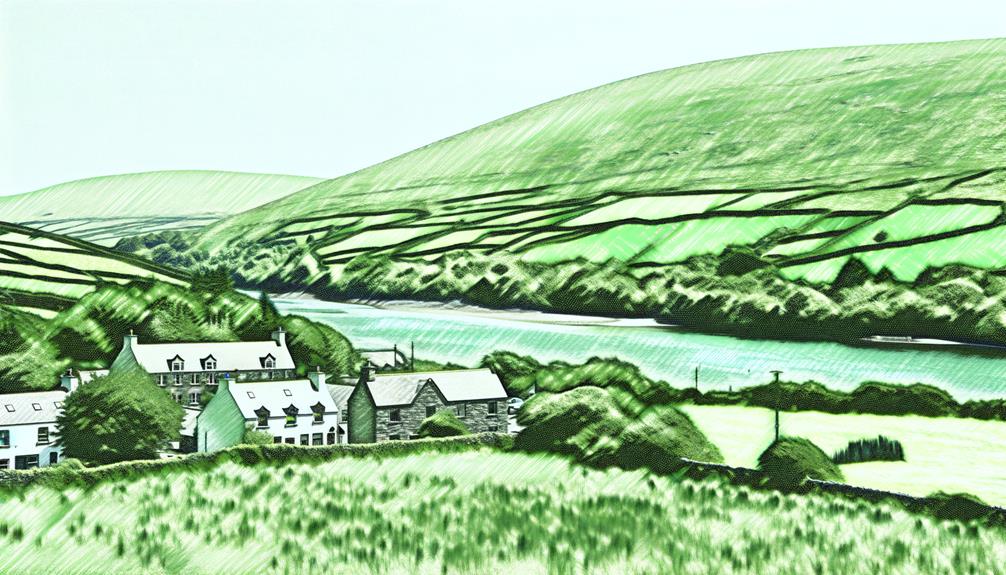Killian Name Meaning and Origin
The name Killian, originally 'Cillian,' is deeply rooted in Gaelic tradition. Stemming from the Old Irish 'Cillín,' it means 'church' or 'monastery,' signifying strong ecclesiastical connections.
Historical forms such as Kilian and Quillian reflect its linguistic evolution over time. The name gained prominence through Saint Kilian, a 7th-century Irish missionary, enriching its cultural significance.
Modern influences, including notable personalities like actor Cillian Murphy, have rejuvenated its appeal. Killian's blend of traditional roots and contemporary relevance make it an intriguing name to explore further for those interested in its rich history and evolving nature.

Key Takeaways
- Killian originates from the ancient Gaelic name 'Cillian,' meaning 'church' or 'monastery.'
- The name has evolved through variations like Cillian, Kilian, and Quillian.
- It is associated with Saint Killian, a 7th-century Irish missionary.
- The name highlights Irish heritage and religious significance.
- Modern popularity has been influenced by media and celebrities like Cillian Murphy.
Historical Roots
The name Killian, originating from the ancient Gaelic name 'Cillian,' has deep historical roots that trace back to early Irish culture and Christian missionary activity.
This name is significantly associated with St. Killian, a 7th-century Irish missionary who played a pivotal role in spreading Christianity in Franconia, now part of modern-day Germany. St. Killian's endeavors in evangelism and his subsequent martyrdom underscored the name's strong association with dedication and faith.
Additionally, the name emerged among early Irish chieftains and warriors, reflecting its integration within both religious and secular spheres.
Consequently, Killian carries a legacy enriched by spiritual devotion and cultural significance, making it a name that resonates with historical depth and multifaceted heritage.
Etymology of Killian
The etymology of the name Killian is rooted in Gaelic origins, specifically derived from the Old Irish name 'Cillín,' a diminutive of 'Ceallach,' meaning 'war' or 'strife.'
Throughout history, the name has undergone various transformations, adapting to different linguistic and cultural contexts. This evolution reflects a broader pattern of historical name variations and the influence of linguistic shifts over time.
Gaelic Roots Explored
Tracing the etymology of the name Killian reveals its deep roots in Gaelic culture, originating from the Old Irish name 'Cillín,' which is a diminutive form of 'Cill,' meaning 'church' or 'monastery.' This linguistic origin underscores the name's historical and cultural significance, often associated with religious sites and figures in early Irish history. The name's evolution through Gaelic society reflects a deep intertwining with ecclesiastical themes and the monastic lifestyle.
| Gaelic Term | Meaning | Context |
|---|---|---|
| Cill | Church | Place of worship |
| Cillín | Little Church | Small monastic site |
| Killian | Derived form | Name bearing spiritual connotations |
Understanding these roots provides a nuanced appreciation of Killian's place within Gaelic nomenclature.
Historical Name Variations
Examining the historical name variations of Killian reveals a complex tapestry of linguistic adaptations and cultural influences that have shaped its evolution over centuries. Rooted in Gaelic origins, the name has undergone several transformations influenced by regional dialects and cultural exchanges.
Key historical variations include:
- Cillian: The original Gaelic form, reflecting the name's deep Irish roots.
- Kilian: A Germanic adaptation, popularized through the veneration of Saint Kilian, an Irish missionary in Franconia.
- Quillian: An Anglicized form that emerged as the name crossed into English-speaking territories.
These variations not only illustrate the name's geographic journey but also highlight the interplay between language and cultural identity, providing insight into the historical dynamics that have shaped its current form.
Linguistic Evolution Over Time
As a demonstration of its rich cultural heritage, the etymology of Killian reveals a name deeply rooted in ancient Gaelic, intertwined with religious and historical contexts.
Originally derived from the Gaelic name 'Cillín,' a diminutive form of 'Ceallach,' it signifies a 'little church' or 'warrior.'
Over centuries, the name evolved through transliterations and regional adaptations, maintaining its core essence while adapting to linguistic shifts.
The Latinized form, 'Killianus,' gained prominence through Saint Kilian, an Irish missionary martyred in the 7th century, further embedding the name in Christian traditions.
This evolution reflects the dynamic interplay between language, culture, and religion, showcasing the name's adaptability while preserving its historical and spiritual significance.
Killian in Irish Tradition
The name Killian, deeply rooted in Irish tradition, derives from the Gaelic 'Cillian,' which is often associated with the ancient monastic heritage of Ireland. Historically, the name is linked to St. Cillian, a 7th-century missionary and bishop, known for spreading Christianity in Franconia. This connection underscores the name's enduring religious and cultural significance within Ireland.
- Monastic Influence: St. Cillian's contributions highlight the name's association with religious dedication and scholarship.
- Cultural Resilience: The name has persisted through centuries of Irish history, symbolizing resilience and faith.
- Symbolism: 'Cillian' often translates to 'warrior' or 'church,' reflecting dual aspects of spiritual and physical guardianship.
These elements contribute to the rich tapestry of Irish heritage encapsulated in the name Killian.
Influence in Europe
Killian's influence in Europe extends beyond Ireland, as evidenced by its historical and cultural impact in regions such as Franconia, where St. Cillian's missionary work left a profound legacy. This name's spread can be attributed to the migration patterns and ecclesiastical missions of early medieval saints.
In Franconia, Killian became synonymous with religious reform and the establishment of Christian communities, embedding itself in local traditions and place names. The reverence for St. Cillian in these areas cemented the name in both ecclesiastical and secular contexts, fostering its adoption among European families.
The enduring presence of the name Killian in European records underscores its significant role in shaping regional identities and cultural landscapes.
Saint Killian
Renowned for his missionary zeal and martyrdom, Saint Killian remains a pivotal figure in the Christianization of Franconia during the early medieval period. An Irish missionary bishop, Killian traveled to the region in the 7th century, dedicating his life to spreading Christianity among the pagan tribes.
Key aspects of Saint Killian's legacy include:
- Missionary Work: He established a Christian community in Würzburg, which became a central hub for religious activity.
- Martyrdom: Killian was martyred around 689 AD, solidifying his status as a saint and symbol of faith.
- Historical Influence: His efforts profoundly impacted the religious landscape, contributing to the eventual Christianization of the area.
Saint Killian's enduring legacy continues to be revered in Christian history.
Modern Popularity
In recent years, the name Killian has seen a notable rise in popularity, as reflected in its current name rankings across various regions.
This surge can be partly attributed to celebrity influence, with several high-profile figures choosing the name for their children.
Additionally, global usage trends indicate a broadening acceptance of Killian, transcending its traditional Irish roots and appealing to a diverse international audience.
Current Name Rankings
As of the most recent data, the name Killian has shown a notable increase in popularity, reflected in its rising position within various national and international baby name rankings. This upward trajectory can be attributed to several factors, including its unique phonetic appeal and historical significance. Analyzing the current trends:
- United States: Killian has climbed steadily in the Social Security Administration's baby name list, indicating growing acceptance and favorability.
- Europe: Particularly in France and Ireland, Killian remains a top choice among new parents, maintaining strong cultural ties.
- Global Trends: The name's versatility and modern resonance have contributed to its rising status in global baby name databases, highlighting its broad appeal.
These factors underscore Killian's growing prominence and enduring charm.
Celebrity Influence Impact
How have celebrities contributed to the modern popularity of the name Killian? The influence of celebrities on naming trends is substantial, often resulting in a marked increase in the popularity of certain names. The name Killian has been significantly impacted by its presence in popular culture, particularly through actors and characters in widely-watched media.
| Celebrity/Character | Contribution to Popularity |
|---|---|
| Colin O'Donoghue | Played Captain Killian 'Hook' Jones in *Once Upon a Time* |
| Killian Scott | Irish actor known for roles in *Love/Hate* and *Dublin Murders* |
| Cillian Murphy | While a variant spelling, his fame has likely influenced Killian's popularity |
| Killian Hayes | Professional basketball player in the NBA |
| Killian Jornet | Renowned mountain runner and ski mountaineer |
Global Usage Trends
The contemporary global usage trends of the name Killian reflect its increasing popularity across various regions, driven by cultural exchanges and media exposure. This name, originally of Irish origin, has seen a surge in usage due to various factors:
- Media Influence: Characters named Killian in popular movies and TV series have heightened its visibility.
- Cultural Exchange: Increased global mobility and interconnectivity have facilitated the spread of diverse names.
- Modern Appeal: The name's unique sound and historical roots appeal to modern parents seeking distinctive yet meaningful names.
These elements contribute to Killian's rising favorability, making it a name that resonates across different cultures and demographics. Thus, Killian exemplifies how traditional names can gain contemporary significance through global trends.
Variations and Spellings
Numerous variations and spellings of the name Killian exist, reflecting its rich cultural history and linguistic adaptations across different regions.
The original Gaelic form, Cillian, has been Anglicized in various ways, including Killian, Kilian, and Cillian. In German-speaking areas, the name often appears as Kilian.
Each variation maintains the core phonetic elements but adapts to local orthographic norms.
Additionally, alternative spellings like Kylian and Cillian are gaining popularity, particularly in English-speaking countries.
This diversity in spelling highlights the name's adaptability and enduring appeal across different cultures.
Understanding these variations provides insight into the name's evolution and its ability to transcend linguistic boundaries while retaining its distinctive identity.
Cultural Significance
Embedded deeply in various cultural narratives, the name Killian holds significant religious, historical, and social connotations that have evolved over centuries. Originating from the Irish name Cillian, it is particularly revered within the context of early Christian missionary work.
Saint Killian, an Irish missionary bishop, is a notable historical figure whose legacy includes the spread of Christianity in Franconia, Germany. The name also resonates within the sphere of Irish folklore and heritage, symbolizing strength and resilience.
To illustrate its broad cultural impact:
- Religious Significance: Associated with Saint Killian, a patron saint.
- Historical Context: Linked to early Christian missionary efforts.
- Social Connotations: Represents Irish identity and heritage.
Thus, the name Killian encapsulates a rich tapestry of cultural meanings.
Conclusion
The name Killian, with its deep historical roots and rich etymological background, stands as a proof to Irish tradition and European influence.
Saint Killian's legacy further cements its cultural significance, while modern popularity showcases its enduring charm.
Variations and spellings reflect its adaptability across different cultures.
Like a thread woven through time, Killian's journey from ancient origins to contemporary use illustrates a tapestry of linguistic evolution and cultural heritage.






